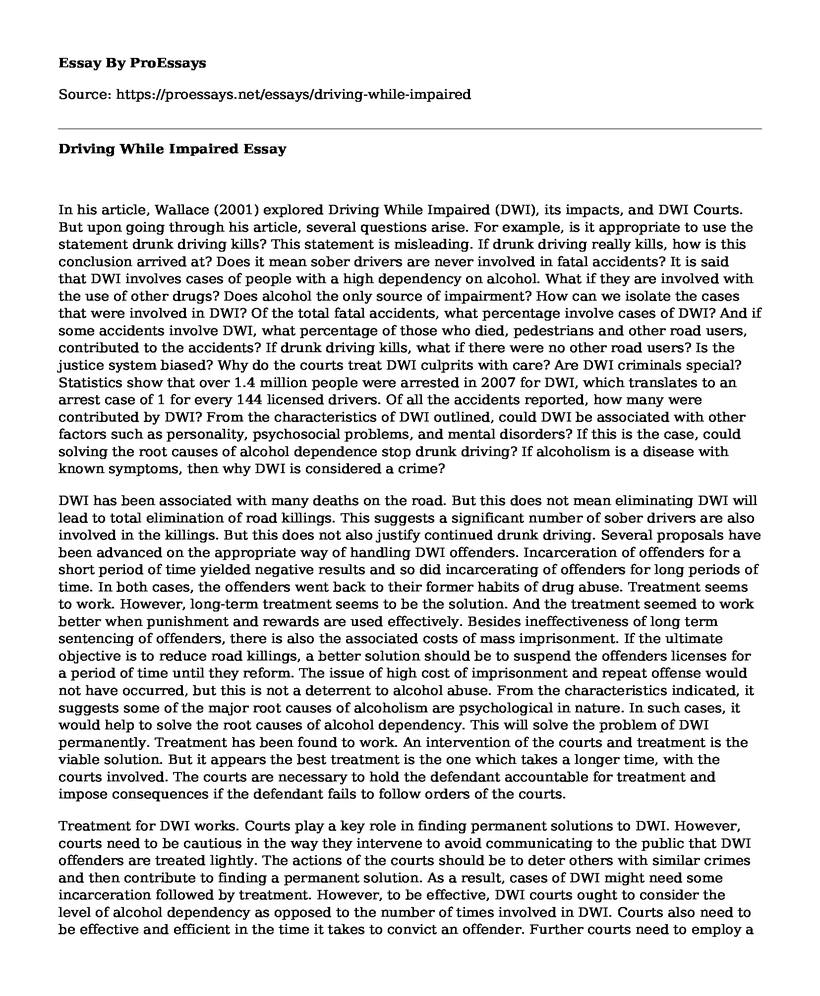In his article, Wallace (2001) explored Driving While Impaired (DWI), its impacts, and DWI Courts. But upon going through his article, several questions arise. For example, is it appropriate to use the statement drunk driving kills? This statement is misleading. If drunk driving really kills, how is this conclusion arrived at? Does it mean sober drivers are never involved in fatal accidents? It is said that DWI involves cases of people with a high dependency on alcohol. What if they are involved with the use of other drugs? Does alcohol the only source of impairment? How can we isolate the cases that were involved in DWI? Of the total fatal accidents, what percentage involve cases of DWI? And if some accidents involve DWI, what percentage of those who died, pedestrians and other road users, contributed to the accidents? If drunk driving kills, what if there were no other road users? Is the justice system biased? Why do the courts treat DWI culprits with care? Are DWI criminals special? Statistics show that over 1.4 million people were arrested in 2007 for DWI, which translates to an arrest case of 1 for every 144 licensed drivers. Of all the accidents reported, how many were contributed by DWI? From the characteristics of DWI outlined, could DWI be associated with other factors such as personality, psychosocial problems, and mental disorders? If this is the case, could solving the root causes of alcohol dependence stop drunk driving? If alcoholism is a disease with known symptoms, then why DWI is considered a crime?
DWI has been associated with many deaths on the road. But this does not mean eliminating DWI will lead to total elimination of road killings. This suggests a significant number of sober drivers are also involved in the killings. But this does not also justify continued drunk driving. Several proposals have been advanced on the appropriate way of handling DWI offenders. Incarceration of offenders for a short period of time yielded negative results and so did incarcerating of offenders for long periods of time. In both cases, the offenders went back to their former habits of drug abuse. Treatment seems to work. However, long-term treatment seems to be the solution. And the treatment seemed to work better when punishment and rewards are used effectively. Besides ineffectiveness of long term sentencing of offenders, there is also the associated costs of mass imprisonment. If the ultimate objective is to reduce road killings, a better solution should be to suspend the offenders licenses for a period of time until they reform. The issue of high cost of imprisonment and repeat offense would not have occurred, but this is not a deterrent to alcohol abuse. From the characteristics indicated, it suggests some of the major root causes of alcoholism are psychological in nature. In such cases, it would help to solve the root causes of alcohol dependency. This will solve the problem of DWI permanently. Treatment has been found to work. An intervention of the courts and treatment is the viable solution. But it appears the best treatment is the one which takes a longer time, with the courts involved. The courts are necessary to hold the defendant accountable for treatment and impose consequences if the defendant fails to follow orders of the courts.
Treatment for DWI works. Courts play a key role in finding permanent solutions to DWI. However, courts need to be cautious in the way they intervene to avoid communicating to the public that DWI offenders are treated lightly. The actions of the courts should be to deter others with similar crimes and then contribute to finding a permanent solution. As a result, cases of DWI might need some incarceration followed by treatment. However, to be effective, DWI courts ought to consider the level of alcohol dependency as opposed to the number of times involved in DWI. Courts also need to be effective and efficient in the time it takes to convict an offender. Further courts need to employ a combination of sanctions and incentives to convicts.
Reference
Wallace, J.D. (2011).The Promise of DWI Court: What Does It Mean and Why Should Prosecutors Care? Chapman Journal of Criminal Justice, 2(1), 101-128
Cite this page
Driving While Impaired. (2021, Mar 11). Retrieved from https://proessays.net/essays/driving-while-impaired
If you are the original author of this essay and no longer wish to have it published on the ProEssays website, please click below to request its removal:
- Cervical Cancer
- Home Visiting and Use of Infant Health Care Paper Example
- Caring Angel Hospital HealthCare Policy Essay Example
- What Aren't You Free to Say? Essay Example
- Essay Sample on Social Work: Advocating for Improved Lives and Well-Being
- Essay Example on Boys & Girls Club: Helping Chicago Youth Reach Their Potential
- Essay Sample on Healthcare Organizations: Successful Strategies for Adapting to Constant Change







